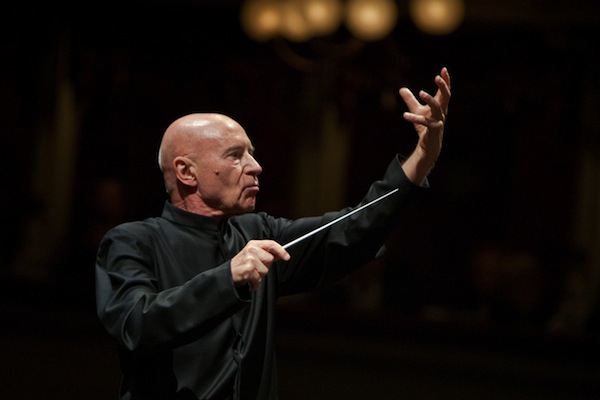With the CSO’s return, Eschenbach leads youthful music of Chopin and Mendelssohn
While pianist David Fray is not quite the fixture in the local music scene as his more renowned father-in-law Riccardo Muti, he made a strong enough impression that many subsequent invitations have been proffered since his Chicago debut in 2011.
The Chicago Symphony Orchestra has a more direct and long-standing relationship to the other guest artist at Thursday’s Symphony Center concert. Christoph Eschenbach was music director of the Ravinia Festival for many summers, and still makes guest podium appearances with the orchestra with some regularity. Leading a slightly reduced orchestra with a few subs in principal chairs, he and Fray seemed genuinely simpatico in Chopin’s Piano Concerto No. 2, even if the performance waded somewhere in the gulf between the routine and the revelatory.
Fray’s adjectives of choice in interviews about the music of the Polish composer include “fragile,” “vaporous,” “perfumed,” and “ephemeral”—stereotypes rooted in reality but also obscuring other facets of Chopin’s art that can’t be ignored in longer works like this concerto, penned at the tender age of 20.
The opening movement showed the pianist in full control of the idiom, teasing out melodic turns, employing tasteful rubato, and voicing the sometimes thick textures with a sensitive touch. But Fray underplayed more muscular passages, draining the work of the dramatic tension that more memorable accounts reveal.
The middle Adagietto of the concerto is its spiritual nucleus and raison d’être, an exquisite creation that brims with extravagantly decorated melodic charm. Fray was clearly at home in this milieu, spinning the meandering filigree with an unforced and elegant ease and gently suggesting the harmonic underpinnings with a pillowy left hand.
The conductor/soloist partnership seemed generally sure, but there were moments in the finale when pianist and ensemble didn’t quite gel. Yet Fray conjured up a Polish mazurka with confident idiomatic flair, balancing the work’s inherent showmanship with a respectful nod to Chopin’s roots.
Like the concerto, Mendelssohn’s Overture to A Midsummer Night’s Dream is similarly the product of a precocious mind, composed as an introduction for a dramatic reading of Shakespeare’s play at age 17.
The quicksilver string patterings introduced here and in his string Octet the year before became a hallmark of his orchestration. CSO’s upper strings had an uncharacteristically difficult time synchronizing the fleet chirps with precision, and one fiddle player even jumped the gun in a later appearance of the gesture. But balances were neatly judged and the clarinet solos soared with light-winged lyricism
Mendelssohn was a comparative codger at 24 when he wrote his Symphony No. 4, a work inspired by an extended Italian sojourn. He seems to have not thought much of the work himself, but Eschenbach’s vivid reading made one wonder how the composer could have ever doubted himself.
The bracing opening movement was sturdy and swift, with rapid-fire woodwind pops and the famous bustling violin tune brimming with virile confidence. The Adagio is one of the composer’s most noble melodic creations, but the conductor choose a tempo too quick for contemplation, leading to an oddly stiff and mechanistic traversal.
The third movement found Eschenbach mining the score for rich inner detail, and the horn and bassoon quartet in the trio lent the section a bucolic charm. The invigorating salterello raced ahead with a blistering edge, the brute virtuosity of each of the orchestra’s sections firing at full bore.
Weber’s opera Der Freischütz may have forever changed the course of German opera, but today only its splendid overture is familiar to most listeners. Eschenbach’s account as the program opener was a highlight of the concert, brimming with atmospheric foreboding and gleaming incantations from brass and woodwinds.
The program will be repeated Friday at 1:30 p.m., Saturday at 8 p.m., and Tuesday at 7:30 p.m. cso.org
Posted in Performances






